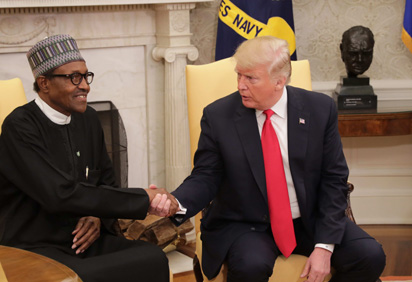There are no products in your shopping cart.
| 0 Items | £0.00 |

 NIGERIA has been officially added the list of nations whose citizens have been banned from receiving US visas after President Donald Trump signed a fresh presidential proclamation yesterday adding six new countries to the list.
NIGERIA has been officially added the list of nations whose citizens have been banned from receiving US visas after President Donald Trump signed a fresh presidential proclamation yesterday adding six new countries to the list.
On December 4, 2017, President Trump introduced the travel ban, naming Libya, Yemen, Iran, Syria, North Korea, Somalia and Venezuela as the affected countries. Yesterday, January 31 2020, the US added Nigeria, Kyrgyzstan, Myanmar, Sudan, Eritrea and Tanzania to the list, considering them major security risks because they are considered breeding grounds for terrorism.
It is no surprise Nigeria is on the list as the nation is number three on the Global Terrorism Index due to the activities of Boko Haram and Fulani cattle herdsmen. Earlier this week, President Muhammadu Buhari himself conceded that the government has failed in providing security, saying he is surprised that Boko Haram has not been defeated by now.
During a debate at the National Assembly on security, Nigerian senators called on President Buhari to sack all his service chiefs as they had failed to deliver. Senate minority leader Senator Eyinnaya Abaribe even called for President Buhari himself to resign as his government was incapable of protecting the lives and property of Nigerians.
With this travel ban that affects all immigrants, except those considered special, whose eligibility is based on having provided assistance to the US government, Nigeria might now just be forced into taking insecurity seriously. This ban will affect all Nigerian immigrants seeking admission to the US on a permanent basis through family, employment, or the Diversity Lottery Programme.
According to the US State Department, the government’s position is that the new countries pose a national security risk or fail to meet baseline requirements. Critics of the ban argue that it is discriminatory and based on impermissible factors, such as national origin and religion, using the case of Nigeria, to point out that ordinary citizens have no say in the formulation of government security policy.
This new travel ban will not affect those who already have US visas or Nigerians resident in the US and asylum seekers can apply for special concessions. Also, Nigerians living on the US are not affected by the development, while anyone who believes they have a special case can apply for a waiver.
Faced with the ban, Nigeria can either seek to resolve the matter diplomatically or take the US government to court. It is unlikely the US government will budge, however, until it sees a significant improvement in Nigeria's approach to security and a commitment to clamp down on terrorism.
President Buhari has been widely criticised for failing to crack down on Fulani herdsmen in particular, being an ethnic Fulani and cattle rearer himself. He has also expressed opposition to regional initiatives to combat the menace, such as the formation of the Amotekun security outfit by the six governors of southwest Nigeria.